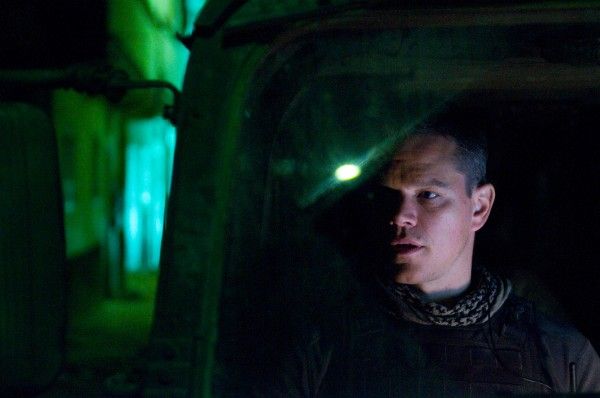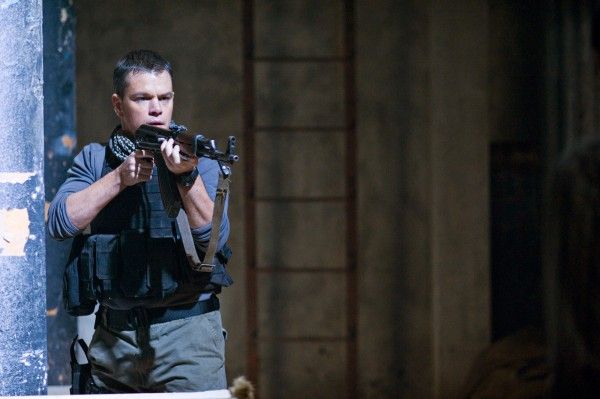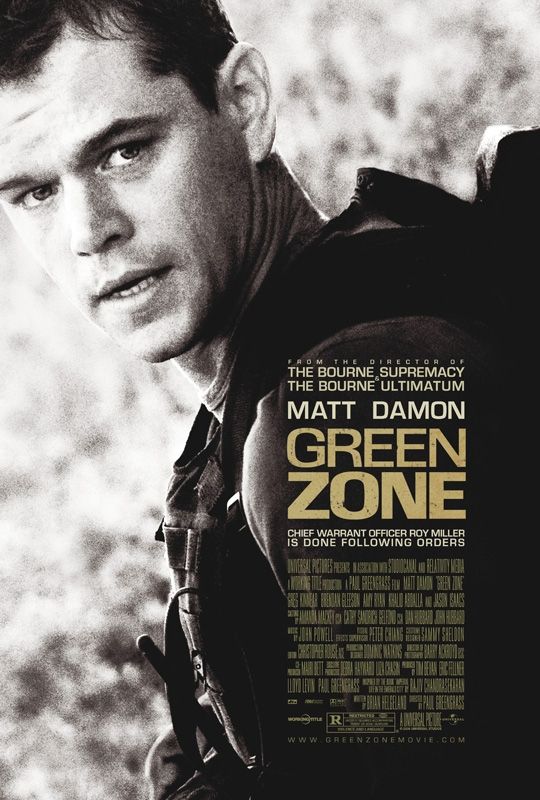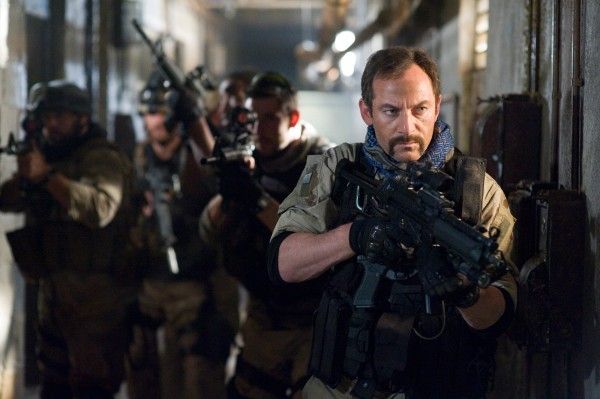While a lot of you only know Jason Isaacs from his work as Lucius Malfoy in the Harry Potter movies, he's been in plenty of other films over the past two decades like Black Hawk Down, The Patriot, and Event Horizon. And this weekend, he plays a tough as nails member of the military in director Paul Greengrass' (The Bourne Supremacy, The Bourne Ultimatum, United 93) Green Zone. The movie is set in the early days of the U.S. led Iraq War and Matt Damon plays a weapons inspector looking for WMD's. If you enjoyed the last two Bourne movies, I'm extremely confident you'll like Green Zone.
To help promote the film, I recently got to participate in a roundtable interview with Jason Isaacs in New York City. He talked about how he got the part, what it was like to film Green Zone, what's coming up in the next two Harry Potter films, and what else he's working on. Read or listen to the interview after the jump:
As always, you can either read the transcript below or listen to the audio by clicking here. Again, Green Zone opens this weekend. Definitely recommended.
Finally, if you want to watch some clips from Green Zone before reading the interview, click here.
--
Question: Was this a project you went after or did it come after you?
Jason Isaacs: No, absolutely not. He's an old friend of mine, Paul, and I was in my loft at home one night a couple years ago and I get a phone call from him and he's says, "Hey Jason, what are you doing?" I say, "Nothing just watching...what are you calling me, you just started a movie." He goes, "Yeah, I'm in Morocco." I go, "How's it going?" He says, "Good, good. What are you doing tomorrow morning?" "Uh...what do you mean?" "What are you doing tomorrow morning?" "I'm playing tennis, why?" He goes, "Want to jump out of a helicopter and beat the shit out of Matt Damon?" I said, "I don't know," and he said, "Come on, come on. Come for a couple weeks." I go, "What is it? What's the part?" He said, "Well, it's a...I don't know. I was going to use a soldier, it's a special forces guy. I'm using a lot of soldiers in this movie, for most of the parts, but I think this one probably requires an actor, but I don't know. But come, it's half-term." Half-term is halfway through the semester, and our kids are friendly and our wives are friendly. He says, "Bring Emma and the kids, we'll have a holiday and we'll just have some fun. And I was there for nine months.
It was between the mustache and the accent, I think it takes a while to realize it's you.
Isaacs: Well, that's the plan. It is my job - to get paid to pretend to be other people.
Was it like, this character comes overnight?
Isaacs: Literally. I mean, that happens...I'm probably telling too many secrets here. I went and hadn't seen Paul, he was on the set directing a scene - and I went to the trailer to try and come up with a look for this character that I really didn't know what he was going to do, particularly, there was a script, but I knew the script changes all the time. So I went to the trailer with the costume on, pretty much the same costume I wore for Black Hawk down, oddly, and then, different rank, and then I went into the makeup trailer and I saw these Iraqi mustaches laid out. And I knew I was playing a very special forces guy, and so I cut some of the mustaches up with the help of the makeup lady, and made that kind of handlebar mustache for myself. And I went down on to the set and I saw a Paul and he said, "Hey Jase! How are you!" and the next thing he said, he looked at me and said, "what the fuck is that?" And I said, "It's a mustache that special forces guys, they get to grow mustaches." I said it in a very serious, grave voice so he might think I knew what I was talking about. I said, "They get to grow facial hair, it's one of the things that separates them from the ordinary serving men." He went, "A-ha. Okay. Uh...you know what? Let's try it in the scene." I said, "What do you mean?" He goes, "Jump on a helicopter." Turn around, he says to the first assistant, "Let's shoot a different scene. Let's get Jason on a helicopter flying in," and I go, "What do you mean? What scene? What am I going to do?" He goes, "Get on a helicopter, Matt [Damon]'s got some prisoners, take his prisoners, don't take any shit. He gets in your way, knock him down, jump on him, kick him, grind his face in the dirt, whatever. You can ignore him. Get the prisoners, get back on the helicopter. Okay, let's go." And I went, "Seriously, that's it? I felt like Ashton Kutcher was going to jump out with a camera somewhere. And that was it. I was jumping on a helicopter, but I was, "What am I meant to say? I don't know how to play...where's this guy from?" And he says, "Find out from your voice." And I jumped on the helicopter and these men, who subsequently became close friends of mine who I filmed with for a year, who were all currently serving soldiers or people just back from Iraq or Afghanistan, and I said, "What do I say? What do I do?" And I tried to understand what they were saying over the scream of the rotor blades, and I was off on a helicopter, and you know, action, and I was on-board the Greengrass express until December.
What was that experience like, you know, performing stunts and jumping out of helicopters with actual soldiers. Is that intimidating?
Isaacs: It's an interesting question because those two things are so closely related. Had I not been surrounded by real soldiers who did this kind of thing all the time in real life threatening situations, there might have been a stuntman doing it. But it felt slightly childish and wimpish to suggest that someone else should stand in for me. In fact, we found out later, we were shooting those - they're not real Blackhawks, they were filming what are called Hueys, old American helicopters which are 40 years old or older, rock and Air Force Ones held together with chewing gum, a piece of string and a prayer - and I was up there thinking, "This is really fucking scary stuff." But I looked at the soldiers and they looked like they're calm and you're clipped in with a really tiny, thin piece of rope, you're just clipped to a bar, but you could easily fall out and be dangling by this rope. As we came in I know that film needs to be seamless, I wanted the helicopter to land and I'd be off running. So when we're maybe 15 meters off the ground, or something, I unclipped my thing and I stood there hovering, waiting to land, I jumped when the helicopter was a few feet off of the ground and only when I got to the soldiers, they said "We thought you were a lunatic. You would never do anything like that, but we had to unclip as well. We were all looking at each other going who the fuck is this guy? Does he have any idea how dangerous this is?" Because they didn't stop me I assumed it was the normal course of events.
So how was it beating the shit out of Matt Damon?
Isaacs: It was great! No, he was really game, I'm not messing before and Paul just went go for it and Matt went, "Honestly, man. Just go for it." And this was not Hollywood sanitized dirt, this was a field full of donkey shit, broken glass and everything like that. And you know, after a while there was some vague choreography, but basically he was going to get in my way and I was going to get him out of my way, and I was going to be tougher and cooler than him, which I can tell was not the case in real life. He ended the first day black and blue, and ripped, and he was more than game for it. That's what he's like on the set and that's what he's like off the set. He's a very solid individual, as they would say in the army.
Paul is known for extended editing and finding the movie in post, and could you talk about your reaction to seeing the movie for the first time? Were there things that you shot that you were like, "oh, that will never make the movie."
Isaacs: Well, there's a lot of things we shot that didn't make the movie, that's always the case on many movies. Because although there was a great script, you get to the set and he creates a lot of spontaneity. There's lots of moments and lines that I came up with that I thought were cool, and every single one of them is gone because he is so much about none of the writing drawing attention to itself. He doesn't want any lines of dialogue that seem like trailer moments. He wants it to be procedural and wants the story to be exciting and none of those bits to be self-conscious. Two things happened when I saw the movie: one, I marveled at this man, who is a friend of mine, so it's very hard to think of your friend as this great talent, and yet I see this and I realize that he's just one of the best filmmakers working in the world today. He can marry entertainment, blockbuster entertainment, with subjects that have real weight and resonance in our world. It speaks to both his ambition and his skill in a way that's very humbling, I think. So I saw the scale of this thing, I saw things that were clearly not on the set, so much of it is digital, it felt literally like someone was given a free pass during the invasion to roam around with a camera and to fly over things with helicopters. I had to remind myself I was there and none of those things were there on the day. And the other thing is he creates a momentum and a level of tension and panic in the film. I felt like I'd done a full workout by the end of the movie, as a viewer I felt like I had done 2,000 sit-ups. And that's a tribute to his sense, again, his sense of momentum and how things needed to be kinetic. He doesn't want to preach to anybody, he doesn't want to make anything that's worthy or important. He wants to tell a story first and foremost, and if there are other provocative issues that come across, they come across subliminally.
Has he changed a lot since you worked for him previously?
Isaacs: Yeah, enormously. We did a film together for the BBC, it was very successful and great, but the camera was on dollies and tracks and was much more traditional. It was dialogue that was delivered as written and it was very good. But he then went off and made a movie, because our thing was very successful on television, he went off and made a movie that was not really his in the sense that he didn't write it, he didn't necessarily take ownership of it. It was not enormously successful, and I remember, because he's been a friend of mine for a long time, I remember the day he made a decision, he said, "I'm going to do my stuff from now on my way, and I'll stand or fall on the strength of it. Of course he's conquered the world since then.
Obviously, I'm going to change subjects for a second, you're in another rather large franchise.
Isaacs: Not anymore. Don't make me cry.
You obviously wrapped on that recently, or not too long ago. Could you talk about your experiences on the last two films?
Isaacs: Well, very sad for me. I was already nostalgic for the history of Harry Potter while I was still making it and I knew the end was coming. It was two films...they made the last book into two films and it was a fantastic experience because everybody's back...everyone who is left alive that is...and even some of the dead people. There is nothing greater than sitting around on a Harry Potter set when you're not filming and listening to the likes of Julie Walters, Maggie Smith, Michael Gambon, Bill Nighy and Jim Broadbent tell stories. And watching everybody chew the scenery up in the few moments you get on screen - trying to out ham each other is magnificent. This big franchise goes out in an epic way. But I was always cognizant of the fact that I'd have to pack up my little furry friend of a wig and stick it in a box and say goodbye to the cane and any magic powers. All the joy was tinged with sadness for me.
The joke is always made that Harry Potter is kind of like what Shakespeare was for actors. Do you ever see Harry Potter becoming a touring thing where they're going to take him on stage...
Isaacs: I can see him becoming, as he already has, the stories. The theme park, for starters obviously, now. A lunchbox, packets of band-aids, I can't imagine there is any end to the world in which Harry Potter can invade. Colonoscopy practice is one too far.
Who would play your part in Harry Potter: The Musical?
Isaacs: Someone with a better voice than me.
Did they use you for the theme park or any of the attractions?
Isaacs: Do you really want to go on a Lucius Malfoy ride? The carriages would fly off or something.
They obviously shot the movie over eight or nine months...
Isaacs: Much longer: fifteen, sixteen months. It's two movies. The last film is two movies, or the last book, rather.
What I'm curious about is, as an actor, how was that for you? How much filming did you do over the fifteen months and were you able to work in other things?
Isaacs: Well, they are incredibly, unbelievably solicitous, actually, and accommodating. Given they have so many people, the logistics must be an absolute nightmare coordinating people's schedules. They would always work around other work commitments that you have, if they possibly can. Very generous of them. Maybe it's because of the nature of this kind of ten-year commitment most people have made, or maybe it's just because they are really nice people. I don't know if any of you had the chance to visit the set, but most film sets are tense places and there is this nonsense received wisdom that an unhappy film set makes great films and that a happy film set makes terrible films. It's rubbish in my experience, because Harry Potter was one of the happiest film sets I have every been on. Everybody feels thrilled and privileged to be there, and you know that what you are making is popular already. There is a fear on most film sets, that "is this going to work, is everyone wasting their money? Is this going to tank and we're all going to lose our houses?" And on Harry Potter you already know you're telling stories that people love and everyone's kind of empowered by that. And, I had a few little bits, I'm not in the book that much, so I can't be in the film that much, but they were spread out over a number of months as they were for everybody else. Incredibly nice about doing everything that they could. There is one sequence in which everyone that's left standing, who's there at the end when the forces of good meet the forces of evil and everybody's schedules had to be subjugated to that, but apart from that, you know... They did the same thing on the first film I did. My wife was having a baby, they scheduled a month, three weeks either side of the due date to make sure that I could be home.
Do you have any new, personal projects that you've been wanting to do?
Isaacs: Well, there's a thing I'm trying to write and there a thing I'm trying to develop. I think I'm slightly superstitious, I don't want to put it out there because, I might not write it very well. And there are parts I would like to play, and then things I am negotiating for, and it ends up being somebody else, and they're deeply bitter that you mentioned it. So I'm slightly superstitious about that sort of thing.
Do you know what you are definitely doing next?
Isaacs: Yeah, I'm doing a film called The Great Ghost Rescue next, which starts in a few weeks. It's a fabulous family comedy, small British film, or medium British film, in the vain of Addams Family meets Beetlejuice meets Ghostbusters kind of thing. It's lovely and fun to do things, family entertainment, particularly when you do a lot of dark and scary and provocative things in between.
A lot of fans have been looking forward to that ending sequence of the second movie...for that huge battle for Harry Potter. Can you talk about filming that sequence and what do you think fans are going to take away from it?
Isaacs: I think over the years that they've been adapting these incredibly popular and successful books, they've increasingly become more and more confident in their ability to make great cinema experiences out of it and where they need to change the book or the central thrust of the story, they do it now with, I think, real aplomb and with Jo Rowling's blessing. And I think the end of the films will be a fantastically cinematic and visual feast. It will more than satisfy the readers of the books...but you won't get is the book on screen. You'll get something more and different. Everybody is very savvy to the notion that this is a much-loved franchise and this will be the end of an eighth film, and it needs to have weight and substance and you need to feel drained by the end of it. It's a ten-year roller coaster ride, not a two-hour roller coaster ride, and we all know it and we all felt it, and it was in the air while we were shooting it.
Have you seen any of the film?
Isaacs: Nothing. I've seen playback on the monitor. Just like with Green Zone, I saw playback on the monitor here, you don't see a fraction of what you see. Which I, honestly, even though I'm in this, and I've seen some of the edit, I was there going, "How the hell did he get access to shoot...wait, what am I saying. Of course he wasn't in the Republican Palace in 2003!" But it would be really fun, you'd come off the statues and the swords, and I remember those images from the news so vividly.
Can you talk about actually filming on-location and if you can go back for one day, what would you go do.
Isaacs: Well, you know, there was a real sense of déjà vu when I arrived on this set because it was exactly the same place that we shot Black Hawk Down. The same area of Rabat [Morocco], I stayed in the same hotel, with the same staff. The menu hadn't changed. It was really...I honestly felt a little Groundhog Day. It was a very different shoot, a very, very different atmosphere on the set. But the same really poor and devastating area of just outside Rabat called Salé which happily doubled for war-torn Somalia in 2001 when we shot, and happily doubled for war torn Iraq, you know, with not that much set dressing and adjustment in 2008 when we shot. You know, it was a humbling experience, a) to be surrounded by real soldiers, who had just gotten back from war or were going back to war when we wrapped, and equally to be in an area of great deprivation where I know the film brought lots of prosperity. We bought out an area and people were very generously compensated, but still, you're aware that you live a life of extraordinary privilege when you shoot in a place like that. So if I could go back for one more day, I wouldn't. That is what I'm saying. Long way of saying that.
You got to do a third part of the trilogy. You have to do a third movie there eventually.
Isaacs: Well, you know what happened, though, is when I did Black Hawk Down, there's a floor of the hotel with the largest suites where the biggest stars in the film had those rooms. And then this time, I was on that floor, and I'm hoping next time I go back I'll be given one of the king's palaces.
You mentioned the provocative issues that come from through, at least subtly, through Greengrass' work, in your words, what are those issues in this film?
Isaacs: Paul is a guy who started off as a documentary maker, and he co-wrote a book called Spy-Catcher which was enormously controversial in England because it was banned by Margaret Thatcher but sold in the rest of the world, and bought by everybody, which was the first time, I think, a spy had ever written a full, confessional biography of MI5, and even when he's making the Bourne films, this is a man who reads all the newspapers cover to cover on the ride over to the set in the morning. Having made these kind of twin tracks of his movie careers, making Bloody Sunday in 1993 and making the Bourne movies, he is trying, and I think very successfully pulls off, to make an absolute genre, blockbuster thriller, an out of control train ride of a movie here. At the same time, as marrying it with real subject matter that comes from possibly our most consequential decisions that are being made in our lifetime. You know, it's the reason cinema was invented, it's what makes movies great. In these days of big screen TVs and maybe even home 3D systems, films like this are the perfect argument for sitting in a big, dark room with hundreds of people and having a thrill ride, because the collective experience engaging with the story of this kind... I don't want to make it sound like I think the film has value or is important. A film like this is an argument for cinema. It's an argument for buying a ticket to a big movie and sitting in a room with a bunch of people. Most films you can see at home on a big screen, big sound, there's something about the collective experience sitting around watching a film like this that feels like it adds value.
If you come into a film, as a viewer, like this, and you're not sure where the truth and fiction depart...
Isaacs: I'll tell you: most of it is true. There's a guy that Matt is based on who I met on the set. When I heard that Paul was going to work with Matt again and was doing this film, I was like, "That's nice, they're friends. I wonder how people will see that." When I got to the set, I found out what the movie was about and I met this guy, Monty, who Matt is based on. There is only one actor in the entire world who should be playing Monty and that's Matt Damon. As soon as you meet him you can't be...there's no two minds about it. He looks like his brother, and this is the guy who headed the WMD unit going in, got nothing and started investigating the intelligence, even though he was a lifelong, committed member of the armed services. He never failed in a mission, Monty said. He said, "I never failed in a mission and I wasn't going to fail now." Began to investigate the intelligence and his journey, his real life story is such a nail-biting blockbuster, that that's where they start and then they go off into even more exciting territory. But so much of it is true, and Paul's made films based on real-life events before, and I know him very well, and he always says, "if it's ever a question between the most exciting story decision and what really happened, you go for the most exciting story decision." But so much of the real-life was compelling, and nail-biting, and dangerous, it was a gift to them making this film.
Do you think that the film should say something, it doesn't say "based on a true story."
Isaacs: It doesn't need to do that. If you think about the most exciting films set in other conflicts in our time, there are elements of truth in all of them. In all of those great films about the Vietnam conflict, for instance, you know, certainly there are a whole bunch of characters that are based on real people, but the point is, and I know that his overriding concern was to make to make something that absolutely gripped you for two hours, made you sweat, made you tense. The primary function of any piece of entertainment like this is to make you want to know what happens next in every moment and I think he does that. It's distraction if you start to talk about, for the audience, the graphics of what is and isn't true, who is and isn't based on a real person, but I'm just informing you, as journalists, that the character Matt's based on, from where the story starts, did, pretty much, everything you see on the screen. It becomes an intellectual exercise in trying to measure what percentage is true and what isn't. We all know the overall truth of what this conflict is about, if he wanted to make a documentary he would have made one and put out a mission statement, he wanted to make a piece of entertainment and so that's what he pulled off, I think.

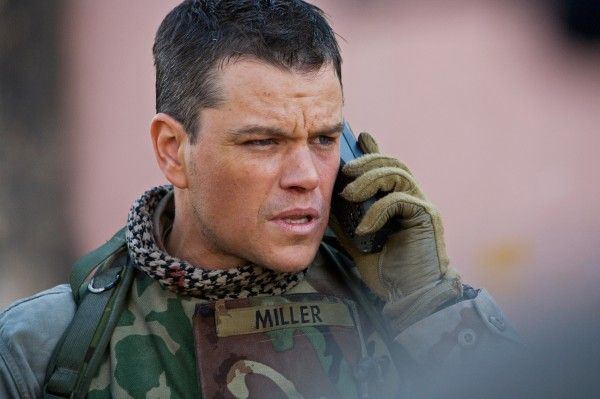
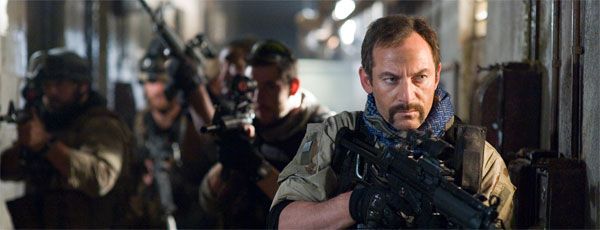
.jpg)
.jpg)
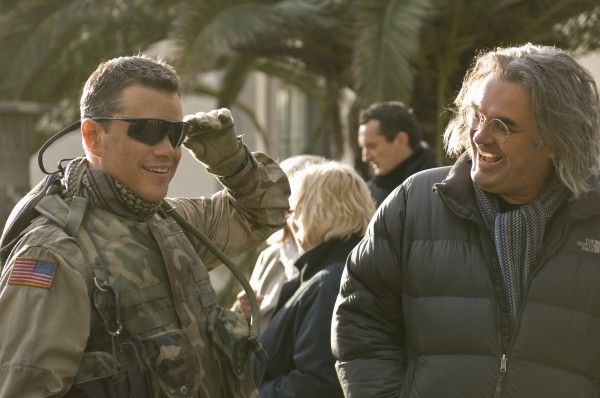
.jpg)
